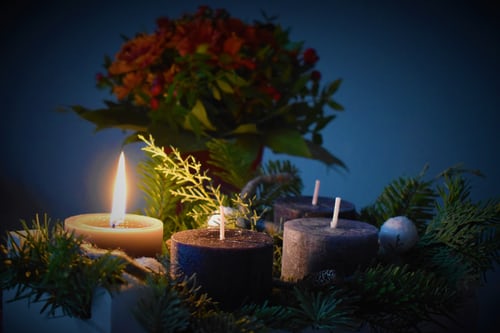I’ll begin this post as I did the last one: I’m sure most, if not all of you have experienced what I’m experiencing right now: a feeling of hanging in limbo. As though you’re unsure of your next move and have difficulty planning your days.
Then I listed some reasons why that could be happening and expanded on the stress and sadness our family is experiencing with my mother’s decline in health and her journey toward the end of her earthly days.
And that was before I was blindsided (the day following the post release) that the memory care home where my mother lives will be closing its doors at the end of this month. That means finding a new place for my mom, at a time in her life that another transition will be very difficult.
Thankfully, God in His infinite goodness found another place for my mom, through my mother’s primary caregiver. We’ve moved her this last Friday.
But the stress of calling hospice and her nurse practitioner and new nurse and making sure that’s all coordinated has added to the blah feelings; and, I am sure, at this point, that I’m dealing with some sadness and depression.
Grief.
And that just amplifies what I was already experiencing.
Post-Easter letdown.
Which really doesn’t need to happen.
The emotional, spiritual, and often physical investment of the forty days of Lent, Holy Week, Maundy Thursday, Good Friday and then the rousing celebrating on Easter Sunday can result in a kind of letdown feeling. As though it all happened, and now it’s over, and a feeling of “what now?” niggles your spirit.
But should I really be experiencing that post-Easter letdown? If I’m experiencing it, I can only imagine what Jesus’ disciples were experiencing on an order of magnitude greater than my doldrums.
But if we look at what happened after the Resurrection, which we started to explore on April 19 post, we see that there was a lot happening between Jesus and His disciples. It didn’t happen the way we often envision it to have transpired.
And that’s where we’re headed in this post. On an eavesdropping and sightseeing walk with Jesus and His followers. Experiencing the far-flung emotions they experienced—the shock, dismay, wonder, giddy joy and thrill of their encounters and the final goodbye that drove them to praise and worship their risen Lord.
As we walk with them, we’ll better understand just how generous and loving and patient and kind our Savior truly is toward us. Then, and now.
And once we understand and appreciate that, we’ll also experience that wonder, thrill and praise-filled joy ourselves.
What transpired with the disciples between Jesus’ death and resurrection?
As far as we can discern from the four Gospel accounts of Matthew, Mark, Luke and John, we get a picture of a terrified group of disciples in mourning. Hidden away in abject fear of the Roman authorities and Jewish leaders, who the disciples believe will be tracking them down and crucifying them too. The Garden of Gethsemane shows them running, after Peter cuts off a temple guard’s ear when trying to defend Jesus. Once Jesus is arrested and taken away, the disciples make a getaway.
But at some point Peter and John follow the group. (I can see them trying to follow the crowd, undetected, in the night.) Because John knows someone there, they gain entry to the Jewish trial proceedings and eavesdrop on that event. That’s where Peter is when he’s accused by a servant girl of being one of Jesus’ followers and does what he swore he’d never do: deny knowing Jesus. And Jesus hears him do it.
Scripture tells us that Peter ran away and wept. Probably bitterly.
John must have stuck around for the proceedings, though, because we get some great details about what transpired. And he seems to be the only one of the twelve that has the nerve to follow Jesus to Golgotha and stand beside the wailing women to watch the crucifixion and Jesus’ death.
Judas goes out in the field to commit suicide over his betrayal of Jesus.
The women disciples, always faithful and seemingly unafraid, station themselves at the cross to be with their Lord and mourn.
After Jesus’ death, two Jewish leaders—secret followers of Jesus—step forward to bury Him in the tomb.
And then the Scriptures are silent on what’s transpiring for three days, although we do know that on the morning of the Resurrection, ten of the remaining followers are assembled together. I can imagine what’s going through their minds.
Agony.
Heartbreak.
Grief.
Disillusionment.
Terror.
Dread.
A what-are-we-going-to-do-now feeling.
Things didn’t go quite according to their plan. Jesus didn’t fulfill all of their hopes and dreams—of conquering the Romans and freeing the Jews from oppression. He didn’t do the conquering king thing, as they expected.
They left their livelihoods and families and dedicated three solid years of their lives to following Jesus, being taught by Jesus, watching Him work, heal, preach, and pray. Now, in one devastating twenty-fours, it’s over.
They’re demoralized, devastated.
And scared to death.
Ever feel like that? When all of your hopes and dreams, all you’d worked for abruptly ended, and you couldn’t see past your pain, fear and disillusionment to think straight. To trust that all is going according to plan or will be worked out.
It’s a sick to the pit of your stomach feeling that sucks the life out of you.
But bless Jesus’ always-perceptive, loving heart. He knows this anguish, and He spends forty days after the resurrection appearing to, speaking with, eating with, walking with and still teaching His followers.
And forgiving them.
What transpires during that forty days following the Resurrection?
- The first thing that happens is Jesus appearing to Mary Magdalene, who has gone with the other women followers to finish the anointing of Jesus’ body that they couldn’t do on Friday due to the approaching Sabbath, when all work was to cease for twenty-four hours.
Can you imagine this woman’s joy when she sees her Lord again? Pause for a moment and consider what might go through your heart and mind if you were in her shoes.
Shock?
Bewilderment?
Inexpressible joy?
Clearly, she and the other women are so excited that they hurry to find the other disciples, to let them know what they’ve heard and seen. And what do the eleven men think?
Unbelief. Because “[the women’s] words seem to them like nonsense.”
I can imagine the yelling and likely arguing that ensued. The anger at not being believed. The chastising and ridicule for such “nonsense” being spoken.
Ever have a heated discussion with someone that doesn’t believe you, or just dismisses what you have to say? It’s more than irritating. You feel patronized and belittled. It’s a horrible feeling.
But Peter and John must have a suspicion that what the women’s report has some merit, because they run to the tomb and take a look for themselves. Luke’s Gospel doesn’t say that what Peter sees immediately convinces him; it says he “wonders what has happened.”
- The next thing Luke recounts is that road to Emmaus encounter with two followers. The one we covered in the last post. Jesus teaches and opens their eyes to what the Scriptures prophesied about Him, reveals Himself to them, and then splits. Disappears, actually.
The two men are so overjoyed that they run seven miles back from where they had just come to tell the other disciples, who are likely chattering up a storm about the recent developments.
Can you imagine the two beating on the door to be let in and then busting out with what they experienced? How could you possibly contain yourself? The scene is likely happy chaos and breathless reporting.
- But before they can get out their fabulous story, the disciples burst out with their own revelation: “It is true! The Lord has risen and has appeared to Simon.”
So somewhere in that time frame on that Resurrection Day, between the appearing and disappearing, Jesus has appeared to Simon Peter. Alone. And if you know your Bible stories well, you can guess—or already know—why Jesus must have done that.
With his denial, Simon had sinned grievously against his friend and Lord. Scripture is clear that he mourned his sin. Can you imagine doing this to your best friend and then having to live with the agony of regret for the rest of your life?
In God’s mercy, He doesn’t allow Peter to suffer. I don’t know what the conversation was; it was a very private interaction. Scripture doesn’t elaborate, but I can imagine.
Peter is likely shamefaced when Jesus appears to Him. Maybe he falls at Jesus’ feet, weeping once again. Maybe he collapses into Jesus’ arms. Maybe he begs for Jesus’ forgiveness.
Whatever happens, we know that Jesus forgives him. And their relationship is fully restored. And there’s nothing quite like a restored precious friendship.
And that’s exactly what happens to us when we repent to Jesus. When we acknowledge our sins and ask God to forgive us. He’s faithful and just to forgive them. Now. Just as He’s been doing for thousands of years.
What relief and joy Peter must have experienced at the restitution. Can you relate?
You feel clean, restored, refreshed. Your heart is unburdened. Life again has meaning and purpose.
- Then, while the Eleven and the other disciples are chattering about all that has happened, Jesus appears. Just shows up. No knocking on the door to be let in. He just materializes and gives them a familiar greeting, “Peace be with you.”
And wouldn’t you know it, even though Mary and Peter and those two Emmaus guys have already seen Him, Luke says, “They were startled and frightened, thinking they saw a ghost.”
Maybe Mary and the women, and the Emmaus walkers and Peter weren’t startled, but I suspect they were. At least a little bit.
How could they not be? While Jesus is real flesh and bone, clearly something remarkable has happened to Him to allow Him to come and go in an instant, to appear and disappear.
Have you ever experienced something that seemed just too good to be true? Something you saw or experienced with your own senses, but you kept second-guessing yourself? You just couldn’t get over the fact that it happened.
Imagine seeing a once bloodied, broken and dead body come back to life, and you get the idea. And who can blame them? I’m sure Jesus’ ability to just come and go like that took some getting used to.
But Jesus gently chides them when He says, “Why are you troubled, and why do doubts rise in your minds? Look at my hands and my feet. It is myself! Touch me and see; a ghost does not have flesh and bones, as you see I have.”
Jesus provides proof. The nail holes haven’t disappeared. The lance-caused side wound remains. He actually invites them to look and touch and see. To be convinced.
To fully believe.
But, because they’re so overcome with joy (Wow! It’s really Him, isn’t it?); and amazed (How could He really be alive and back in our midst?!), they still aren’t fully convinced. Meaning, they probably wouldn’t stake their lives on it as they eventually end up doing.
Again, in His love and patience, Jesus asks, “Do you have anything to eat?” When they provide him with a piece of boiled fish, He took it and ate it right there in front of them. To further prove his flesh-and-bones existence.
- Jesus reiterates to them that He told them all about this when He was with them those three years—the prophecies about Him in the Law of Moses, the Prophets and the Psalms. He opens their minds to understand all that’s been written. He says,
“This is what is written: The Christ will suffer and rise from the dead on the third day, and repentance and forgiveness of sin will be preached in his name to all nations, beginning at Jerusalem. You are witnesses of these things.”
And then he gives them another promise, and directions:
“I am going to send you what my Father has promised; but stay in the city until you have been clothed with power from on high.”
Power from on high? Who wouldn’t want to stick around for that!
Is there more in the forty days after the Resurrection?
In order to learn more about what transpires in those forty days, we need to jump over to the Book of Acts, where Dr. Luke expounds on the story.
In chapter 1 we read:
“After his suffering, he showed himself to these men and gave many convincing proofs that he was alive. He appeared to them over a period of forty days and spoke about the kingdom of God. On one occasion, while he was eating with them, he gave them this command: ‘Do not leave Jerusalem, but wait for the gift my Father promised, which you have heard me speak about. For John baptized with water, but in a few days you will be baptized with the Holy Spirit.’”
Verse six indicates by their question that they’re still hung up on the kingdom restoration to Israel thing, so He tells them, bluntly, that it’s none of their business when that’s going to happen. And then He tells them what they will be doing for Him:
“But you will receive power when the Holy Spirit comes on you; and you will be my witnesses in Jerusalem, and in all Judea and Samaria, and to the ends of the earth.”
In essence, He tells them that thy have a big job to do for Him. Others need to know about Him, and be offered salvation and restoration to God. And it’s going to be their responsibility to get evangelism kick-started.
Evidently that instruction comes on His very last day with them, after He led them out to the vicinity of Bethany, (as Dr. Luke reports in the last verses of his Gospel), when Jesus performs His final act upon the earth.
Jesus’ final act upon the earth—
Jesus has appeared. Jesus proves many times over—in front of a multitude of witness—that He was dead and is now alive.
He has forgiven. He has taught. He has given additional instructions. And now He performs His final, loving and encouraging act.
He lifts up His hands.
And blesses them.
What He said is not recorded, but we can be assured that His words were tender, loving, uplifting. Maybe something along the lines of probably the most famous benediction in Scripture:
“The Lord bless you and keep you;
The Lord make His face shine upon you,
And be gracious to you;
The Lord lift up His countenance upon you,
And give you peace” (Numbers 6:24-26)
Maybe He personalized it by saying “I bless you and will keep you. I will make my face shine upon you, and be gracious to you…”
But perhaps it was more personal. These are, after all, the closest and dearest, most beloved friends He had during His life on earth. The men and women He had spent an intense and busy three years with. The people He’d joked with, laughed with, ate and camped outside with. The ones who knew Him best.
At least as well as one can possibly know the One who is fully God and fully man.
And in the midst of that blessing, while He’s blessing them, Jesus is elevated into heaven. Slipping through what is likely a thin veil between heaven and earth; returning to the Father in glory.
The Magnificent Ascension.
He leaves them again, this time with that blessing on their hearts and minds.
A glorious memory of their Lord to take and carry with them.
Luke then tells us in his Gospel that after He disappears, His followers begin worshipping Him. And they obey His directions by returning to Jerusalem with great joy. Not just a little joy, or a general kind of joy, but GREAT joy.
Once there they head to the temple, where they continually praise God.
A jump over to the first chapter of Acts gives us the full picture.
While Jesus is disappearing into the clouds, the disciples stand staring up into the sky. I can just see all of them standing in a clump, mouths open, heads back, eyes fastened on Jesus, and then those clouds. Maybe they could still hear His voice through the opaque mist.
Luke says they “were looking intently.”
Can’t you just see them, heads bent backward; eyes straining to see. Maybe they’re waiting Him to come back down to the earth. After all, He disappeared once, and then reappeared and disappeared and reappeared. Perhaps He would do it again.
It takes two angels dropped down to earth beside them to get them to re-focus.
“Men of Galilee,” they said, “why do you stand here looking into the sky? This same Jesus, who has been taken from you into haven, will come back in the same way you have seen him go into heaven.”
That’s good enough for them. Nothing like a couple of suddenly-appearing guys dressed in bright white to get your attention. The disciples hit the road and head back to Jerusalem. To wait, as their Lord instructed.
They’ve learned well enough now to believe and to trust, and do as they’re told.
And do it with praise and worship in their hearts and on their lips.
What does this story have to say to us?
This is an amazing story. A true and living story.
It’s not a story of an indifferent God who put in His ministry time, suffered, got the reparation job done and then promptly returned home.
It’s the story of a loving God. A compassionate God. A God who seeks, and takes the first steps to forgive and restore.
A God that loves and longs to bless us!
The crushing pain and devastating loss at the crucifixion has been lifted and erased. There is no more sorrow. Only joy and worship and forward-looking living.
Jesus’ physical presence will soon be replaced with His spiritual one. The One that’s busy in the world right now—working, teaching, healing, saving, and leading.
Just exactly like the physical Son did while He was on earth.
I would caution you to not let your imagination run amuck, in haste to fill in what isn’t said in Scripture, but can you see yourself in this story? Can you hear Jesus’ words and actions; imagine yourself as a disciple?
Let me provide a few questions to get you started.

Invitation—
- Close your eyes and imagine all that Jesus said and did during that forty days. Imagine Him blessing His follower friends, and then imagine Him blessing you.
- When was the last time you asked Jesus for His blessing upon you and your life? Upon your day; upon a significant moment in time.
Take the time to do it right now. Lift your hands to the heavens to receive the blessing. And praise and worship Jesus for giving it. Rejoice, just as the disciples did that day in Bethany and Jerusalem.
- Spend a moment considering the characteristics that mark the disciples at this moment in their lives, at the end of Luke’s gospel and the opening of Acts.
They praise.
They worship.
They obey.
And then ask yourself: How much of my day, week, year, or life is or has been marked by praise?
If you’re lacking that component in your life, begin today.
If you’re not sure how to praise, ask the loving Savior to show and lead you.
If you need forgiveness, repent and ask Him to forgive you.
If you’re on the outside of that disciple circle looking in, and want to know how you become a part of it, take the steps needed to break through the circle.
Acknowledge that Jesus is the Savior, the Son of God. The Messiah, who took upon Himself the sins of all mankind, suffered and paid a penalty that you owed.
Ask Him to forgive you of your sins. If you aren’t sure what they are, ask Him to reveal them to you. He will.
Tell Him you want to be a follower, a child of God.
Ask Him to send the Holy Spirit to inhabit your heart so you are counted as one of God’s children.
Then offer praise and worship to the One who restores you from death to life and prepares a place for you to live in Heaven. The One who has given you hope and a future.
And rejoice!
Why are we looking at the Ascension right now, this long after Easter.
Because this Thursday, May 13, marks Ascension Day, the commemoration of the end of Jesus’ forty days son earth following His resurrection.
Consider it anew and what it means for you.
NEXT WEEK: We’ll continue the story with a look at Pentecost—the event that initiated the age of the Church. We’ll celebrate the anniversary.
Until then, praise, worship and obey.
Blessings,
Andrea
“Beloved, I pray that you may prosper in all things and be in health, just as your soul prospers.”
Andrea Arthur Owan, M.S., A.T., R., is a health and fitness pro, speaker, award-winning inspirational writer, memoirist, and senior-ordained chaplain (IFOC). She helps people thrive physically, emotionally and spiritually and recover from grief, loss and trauma.





